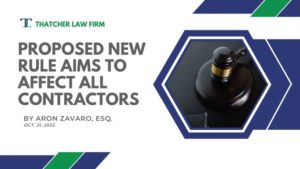
On Oct. 13, the U.S. Department of Labor issued a proposed rule that could many employers, especially those operating in the “gig economy.” The proposed rule would change who could potentially be classified as an independent contractor as opposed to an employee.
Why is this distinction important? Independent contractors are not entitled to minimum wage and overtime protections, protection under various anti-discrimination laws, employer-paid payroll taxes, workers’ compensation, unemployment insurance, other employer-sponsored benefits like health insurance, and many other benefits and protections employees enjoy.
The proposed rule would officially rescind a 2021 rule that made it easier for companies to classify workers as independent contractors under the federal Fair Labor Standards Act (FLSA). The Labor Department has stated that rescinding that rule and limiting independent contractor classifications will bring the agency’s position back into consistency with the courts’ long-standing interpretations of the Fair Labor Standards Act, which establishes the right to minimum wage and overtime pay for employees.
What could change?
The courts routinely appeal to the “economic reality test” in order to determine whether someone is an employee or an independent contractor. This test consists of six independent factors, none of which is dispositive. These six factors are:
- The degree to which the company or the worker controls the details of the work
- Whether the work requires special skills
- How permanent the relationship is between the company and the worker
- The relative investment made by the company and the worker in order to perform the work
- Whether the worker has significant control over the opportunity to profit or taking losses
- Whether the work is integral to the company’s business
The sixth factor of this test was eliminated by the Department’s 2021 rule. The new proposal would reinstate this factor, thereby bringing the Department’s approach in line with existing case law.
Another purpose of the new rule is to avoid worker misclassification by making it easier for both companies and workers to understand the distinction between employees and independent contractors. As the agency pointed out in its press release, misclassification deprives workers of their federal protections and rights. Moreover, misclassification is most often found among lower-wage workers in areas such as janitorial services, delivery, hospitality and home care.
What employers need to know
Whether an individual qualifies as an independent contractor calls for an objective assessment of their individual circumstances. Employers must use the six factors listed above to determine how to properly classify their workers. Failure to properly classify employees can come with steep consequences. For example, failure to pay wages to employees under the FLSA can result in hefty liquidated damages. For this reason, employers should consult with an attorney if they are uncertain about how a particular worker should be classified.
If you have questions about employee classification, contact Thatcher Law Firm at 301-850-1246. www.ThatcherLaw.com. Follow us on:
